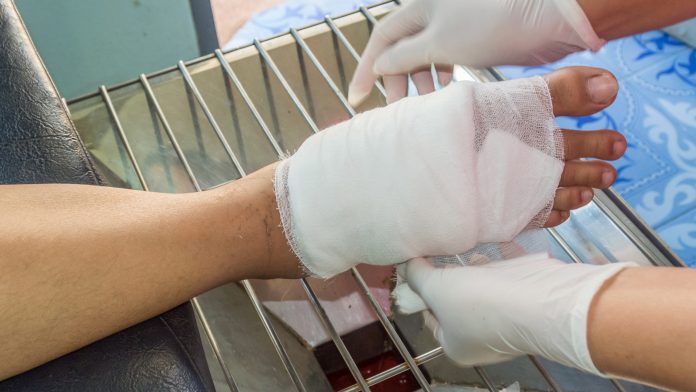
Customised and specialist wound dressings with skin-like properties are being developed as part of a collaborative research project.
In a joint venture by Skinomics GmbH from Halle, Martin Luther University Halle-Wittenberg and the Fraunhofer Institute for Microstructure of Materials and Systems IMW, scientists are using biomedically applicable materials based on tropoelastin to create specialist wound dressings. Offering biocompatibility, durability, biodegradability, and mechanical properties like those of skin, preclinical tests have confirmed the material’s suitability for use on chronic and complex wounds.
As complex wound diseases – such as venous ulcers, leg ulcers, and foot ulcers – are very common in today’s ageing society and can be of detriment to patients and the healthcare system, specialist wound dressings designed to speed up treatment are in high demand. To meet this need, protein-based materials are now being used to treat such wounds, but the fact that they are made from animal tissues has raised concerns. Alongside the increased risks of infection or adverse immune reactions, medical products of animal origin can also spark ethical debates.
Biomedical alternative to animal-based materials
With the aim of creating an alternative to animal-based specialist wound dressings, the joint research project is currently developing customised, biomedically applicable materials based on human tropoelastin. This precursor protein is converted in the body to elastin – a vital and long-lived structural biopolymer that has exceptional mechanical properties and provides the skin and other organs with the elasticity and resilience they need to function.
Dr Christian Schmelzer, Head of the Department of Biological and Macromolecular Materials at Fraunhofer IMWS, said: “Elastin is chemically and enzymatically extremely stable, biocompatible, and does not produce immunological rejections when used as a biomaterial in humans. Therefore, we want to create new and innovative solutions for the treatment of complex wounds based on human tropoelastin.”
Personalised wound care
Led by Professor Dr Markus Pietzsch of Martin Luther University Halle-Wittenberg, the research team has successfully developed a biotechnological process for modifying tropoelastin. The modified tropoelastin is processed at Fraunhofer IMWS. Here, an electrospinning procedure is used to produce ultra-thin nanofibers with diameters of only a few hundred nanometers. The resulting nonwovens are further crosslinked to stabilise them for the respective application. The procedures developed have been optimised so that biomedical parameters such as pore size, stability, and mechanical properties are variable and can therefore be customised to meet the requirements of the respective wound treatment. The materials produced using the new procedures are being investigated by Skinomics GmbH in initial preclinical tests to determine their skin compatibility and have already achieved promising results.
The project is due to finish at the end of this year; researchers will then file applications for intellectual property rights as a step towards a subsequent product development phase for certified medical products.









